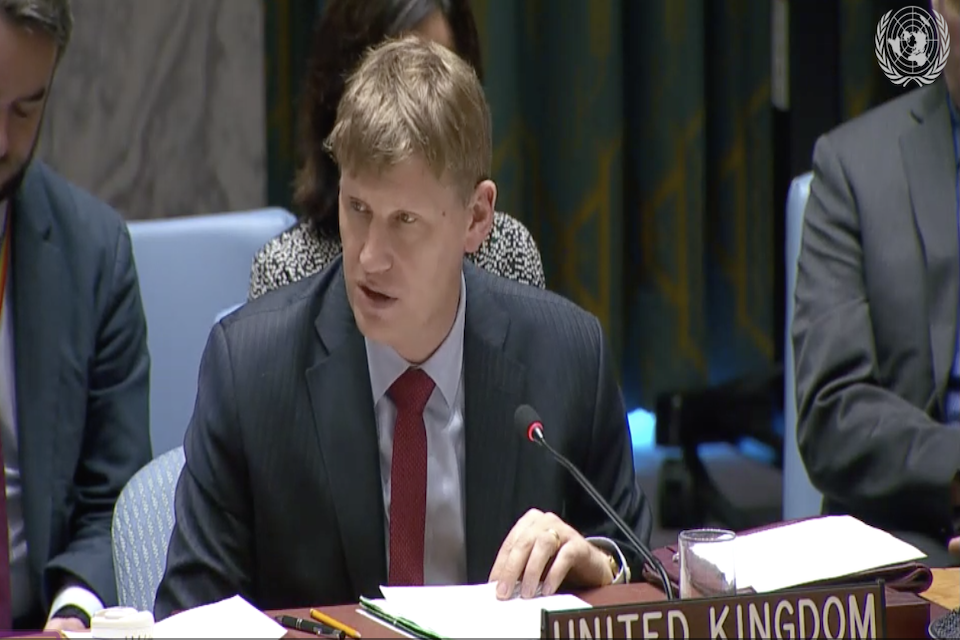Security situation in north east Syria remains volatile
Statement by Ambassador Jonathan Allen, UK Deputy Permanent Representative to the UN, at the Security Council briefing on the situation on Syria.

The UK welcomes the fact that the US-brokered ceasefire is holding in north-east Syria and that the fighting appears to be over. We note the agreement announced on Tuesday by Presidents Putin and Erdogan that this ceasefire is now permanent and the subsequent announcement statement from the Turkish Ministry of Defence that they see no need for further operations.
In that context, let me say that we call on Turkey, as all actors in this Syrian conflict, to comply with the obligations towards civilians under international humanitarian law.
We will be looking very closely at the details and implementation of the agreements announced, including its impact on governance and the local population.
The security situation in the north-east remains volatile. Military developments have led to 180,000 people displaced, 80,000 of whom are children, and over 10,000 have fled to Iraq. A number of international aid workers felt compelled to leave, which has had a serious impact on operations. It is essential that humanitarian actors have unrestricted access to areas where people continue to be in need.
We hope that these displaced people will soon be able to return to their homes safely and that damage caused to critical infrastructure is swiftly repaired.
Mr President, on 16 October, this Council agreed press elements expressing our collective concern about the impact of recent developments on the humanitarian situation and the possible resurgence of Daesh. The Sochi agreement has not alleviated our concern. It is imperative that the Council is kept informed of the humanitarian situation, including in IDP camps, as well as on the threat posed by Daesh.
We note the return of regime forces to areas of north-east Syria, following the agreement between the SDF and Damascus. Given the appalling record of the regime’s security forces elsewhere, the behaviour of these forces is something we will monitor very closely.
We continue to support the rights of Syrian refugees to return to their homes when it is considered safe to do so. But we would have serious concerns about any attempt to force refugees to return to Syria against their will.
Mr President, any returns must be voluntary and in line with UNHCR principles. Any attempt at deliberate demographic change would be unacceptable.
Mr President, the United Kingdom is one of the largest donors to the humanitarian needs of Syrians, and we do so throughout Syria, and in its neighbours. There is no politicisation in our provision of life-saving support. But as we and our European Union partners have previously made clear, we will not provide stabilisation or development assistance in areas where the rights of local populations are ignored.
All of these concerns mean that the role of the United Nations has a much more important in north-east Syria, particularly given the difficulties being faced by other humanitarian agencies. To allow humanitarian agencies to prepare, plan and respond, we would welcome clarity about how the United Nations plans to scale up its response.
Assistant Secretary-General Mueller made clear the need for the renewal of the cross-border aid resolution, 2449. And I’d also like to acknowledge Madame Marcaillou’s assessment and depiction of the scale of the challenge. And as UNMAS seeks to step up its efforts, we will need and we expect to see the regime cooperating fully and allowing access.
Mr President, we cannot let events elsewhere in Syria distract us from the dire humanitarian situation which persists in Idlib. We were extremely concerned to learn of the resumption of airstrikes and shelling last week.
Since the beginning of May, let us remember that over 1,000 civilians have been killed, including more than 500 women and children, and over 688,000 people have been forced to leave their homes. So we urge all parties to respect the ceasefire agreed on 31 August. And we look forward to the Board of Inquiry’s investigation into the appalling attacks in Idlib and its subsequent update to this Council.
The United Kingdom would once again like to welcome the first meeting of the Constitutional Committee next week. This is a momentous occasion. Mr Pedersen has the United Kingdom’s full backing.
A political process in line with Security Council Resolution 2254 is crucial to peace in Syria. The Syrian people have suffered through nine years of conflict and, as events in Idlib and the north-east testify, that suffering is not over.
Mr President, the Constitutional Committee is an opportunity for Syrians from all sides to sit down, to grapple with the real issues which have caused the conflict. It is an important signal. But it must more than that. It must be the start of real, genuine change. That will require serious engagement and commitment from all participants to succeed. Unless the regime realises that its actions have been a fundamental reason for the conflict, nothing will be achieved. We call on the regime representatives to demonstrate that at the upcoming first meeting.
Thank you, Mr President.